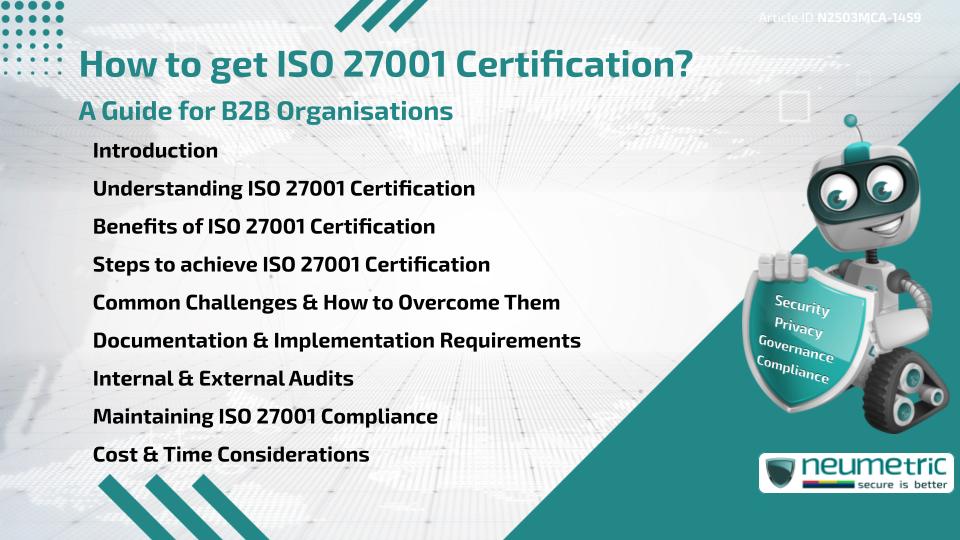Table of Contents
ToggleIntroduction
ISO 27001 certification is a globally recognized Standard for managing Information Security. Organisations seeking to enhance their security posture, gain Customer trust, & comply with regulations often pursue this certification. This guide provides a step-by-step approach to how to get ISO 27001 certification, outlining the key requirements, benefits, & challenges involved.
Understanding ISO 27001 Certification
ISO 27001 is an international Standard for an Information Security Management System [ISMS]. it provides a systematic approach to securing sensitive information, addressing risks, & ensuring regulatory compliance. Certification involves a structured process, including Risk Assessment, control implementation, & Audit verification.
Benefits of ISO 27001 Certification
- Enhances data security & risk management
- Builds customer & stakeholder trust
- Helps comply with legal & regulatory requirements
- Improves operational efficiency through structured processes
- Provides a competitive edge in the market
Steps to achieve ISO 27001 Certification
Step 1: Understand the Standard
Familiarize yourself with ISO 27001 requirements & controls. The Standard includes Annex A, which provides a set of Security Controls for various risk areas.
Step 2: Conduct a Gap Analysis
Assess current security practices against ISO 27001 requirements. Identify areas needing improvement to align with the standard.
Step 3: Establish an ISMS
Develop & implement an Information Security Management System [ISMS] to manage security risks systematically. This includes policies, procedures, & Security Measures.
Step 4: Conduct a Risk Assessment
Identify potential threats & vulnerabilities to Information Security. Use a structured Risk Assessment methodology to evaluate & address risks.
Step 5: Implement Controls
Apply appropriate Security Controls to mitigate identified risks. These may include access controls, encryption, & incident management processes.
Step 6: Train Employees
Ensure that Employees understand security policies & their role in maintaining compliance.
Step 7: Perform Internal Audits
Conduct Internal Audits to assess compliance & identify areas for improvement before the official certification Audit.
Step 8: Undergo Certification Audit
Engage an accredited certification body to conduct an External Audit. The process includes a documentation review & an on-site assessment.
Step 9: Maintain Compliance
Regularly review & update security policies & controls to sustain certification & improve security posture.
Common Challenges & How to Overcome Them
Lack of Awareness & Expertise
Solution: Provide training & hire experienced professionals.
Resource Constraints
Solution: Allocate a dedicated team & use automation tools where possible.
Resistance to Change
Solution: Educate Employees on the benefits of ISO 27001 certification & involve them in the process.
Documentation & Implementation Requirements
Organisations must document policies, procedures, & Risk Assessments. Key documents include:
- ISMS Policy
- Risk Assessment Report
- Statement of Applicability
- Incident Management Procedure
Internal & External Audits
Internal Audits
Internal Audits help identify gaps & improve Security Measures before external assessments.
External Certification Audits
Conducted by an accredited body, External Audits determine compliance with ISO 27001 standards. The process includes:
- Stage 1 Audit: Documentation review
- Stage 2 Audit: On-site assessment
Maintaining ISO 27001 Compliance
Compliance is an ongoing process. Organisations must:
- Conduct regular risk assessments
- Update policies as per evolving threats
- Perform internal audits & management reviews
Cost & Time Considerations
The cost of how to get ISO 27001 certification varies based on company size, complexity, & readiness. Typical expenses include:
- Training & consultancy fees
- Audit & certification costs
- Implementation resources
Timeframes range from several months to over a year, depending on organisational preparedness.
Takeaways
- ISO 27001 certification enhances security & business credibility.
- The process involves risk assessment, control implementation, & audits.
- Ongoing compliance ensures long-term benefits.
FAQ
What is the first step in getting ISO 27001 certification?
The first step is understanding ISO 27001 requirements & conducting a gap analysis to assess current security practices.
How long does it take to get ISO 27001 certification?
The timeline varies but typically ranges from six (6) months to one (1) year, depending on the organisation’s readiness.
What are the costs involved in ISO 27001 certification?
Costs include training, consultancy, Audit fees, & implementation resources, which vary based on company size & complexity.
Is ISO 27001 certification mandatory?
No, it is not mandatory, but it helps organisations improve security & meet regulatory requirements.
How often is recertification required?
ISO 27001 certification is valid for three (3) years, with annual surveillance Audits required for maintenance.
Can Small Businesses get ISO 27001 certification?
Yes, Small Businesses can achieve ISO 27001 certification by scaling Security Measures to their size & complexity.
What happens if an organisation fails the certification Audit?
Organisations can address non-conformities & undergo a follow-up Audit to achieve certification.
What are the key documents required for ISO 27001 certification?
Essential documents include an ISMS policy, Risk Assessment report, statement of applicability, & security procedures.
Does ISO 27001 certification guarantee complete security?
No, but it significantly enhances security by providing a structured approach to Risk Management & compliance.
Need help?
Neumetric provides organisations the necessary help to achieve their Cybersecurity, Compliance, Governance, Privacy, Certifications & Pentesting goals.
Organisations & Businesses, specifically those which provide SaaS & AI Solutions, usually need a Cybersecurity Partner for meeting & maintaining the ongoing Security & Privacy needs & requirements of their Clients & Customers.
SOC 2, ISO 27001, NIST, HIPAA, HECVAT, EU GDPR are some of the Frameworks that are served by Fusion – a centralised, automated, AI-enabled SaaS Solution provided by Neumetric.
Reach out to us!





